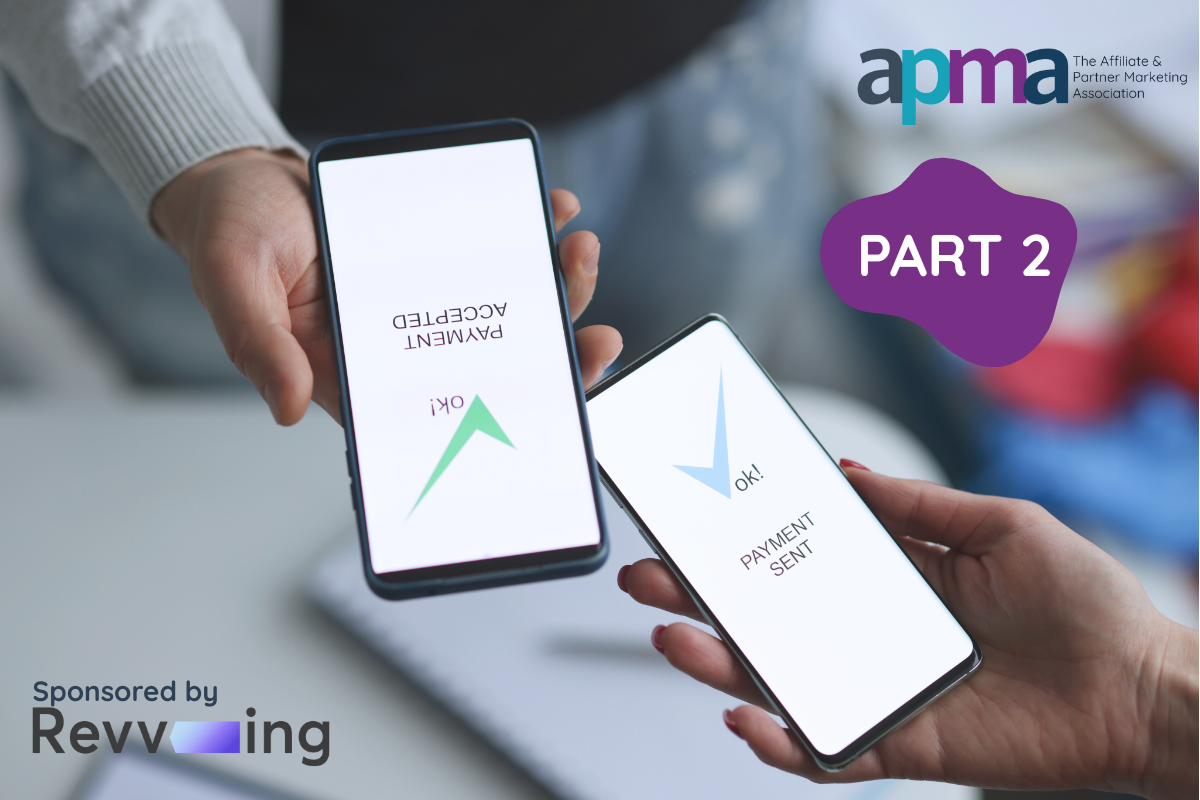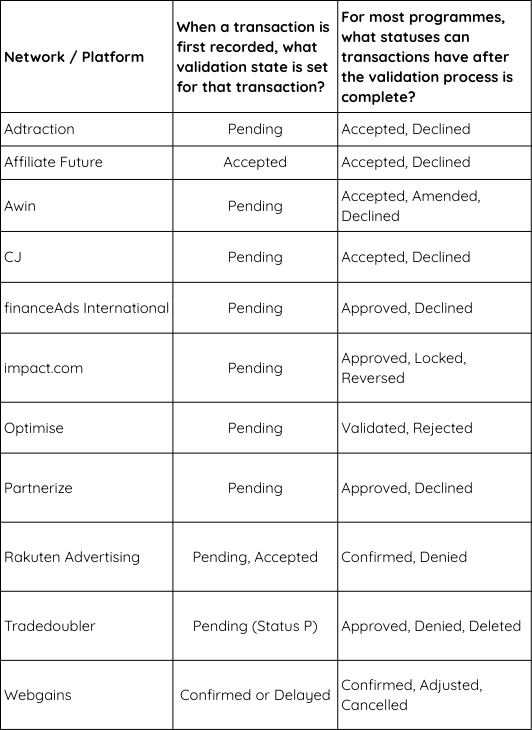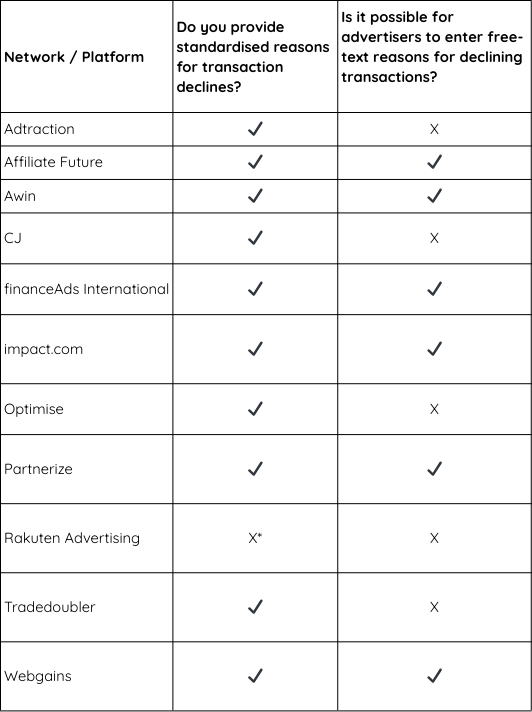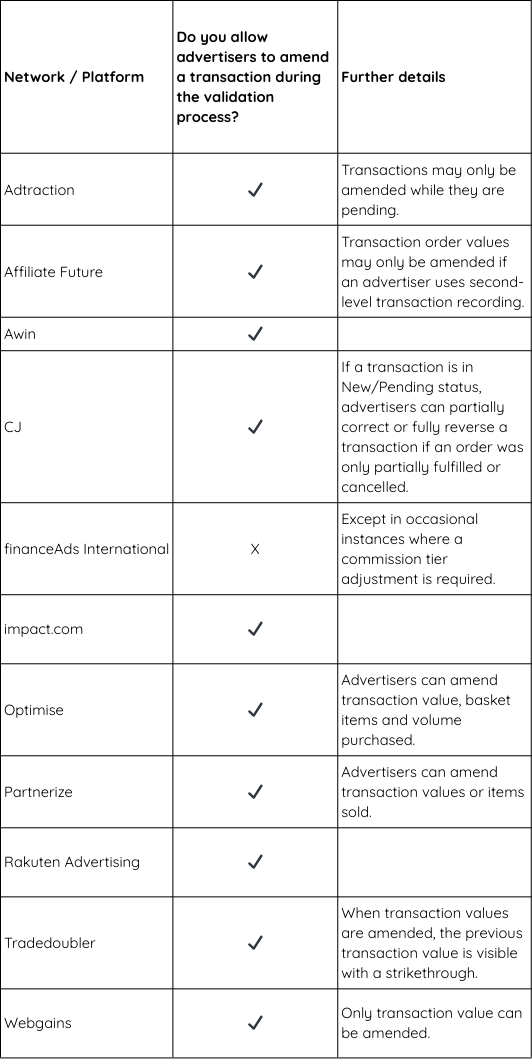
This is the APMA’s guide to affiliate marketing and publisher payments. It has been divided into three accessible articles. The full PDF guide is now available to download.
In part two we look into how networks and platforms record affiliate transactions, including an investigation of the validation process with a focus on promptness of validation, reasons for declined transactions and the means for managing and amending these.
How are affiliate transactions recorded?
Affiliate transactions are recorded through tracking technologies that attribute customer actions, such as purchases or sign-ups, to the publisher that referred them.
When a user clicks an affiliate link or uses a tracked promotion code, a unique identifier is generated and stored, often via cookies or server-side tracking. This identifier allows the affiliate network or platform to link the transaction to the publisher.
Once the user completes the desired action, the advertiser’s system sends the transaction details to the affiliate platform, including the order value, time, and any associated product information.
The transaction is then logged with a status, such as pending, indicating it is under review. After validation by the advertiser to confirm eligibility, the transaction status is updated to approved or declined, and commissions are calculated accordingly.
Enhanced transaction reporting
Most networks and platforms offer enhanced transaction reporting, to give more detail on what was sold.
This can enable publishers to optimise their campaigns and can be used by advertisers to set custom commission and validation rules or analyse the performance of particular sale attributes. Examples of enhanced transaction reporting include:
- Product-level Reporting: See the items contained within a transaction.
- SKU: Enables the item sold to be matched to a unique identifier number.
- Category: The type of item sold, frequently used for category-level commission groups.
- Customer Status: New versus returning customers.
- Stay Dates, Destination, Trip Duration, etc: Frequently used by travel advertisers.
- Detailed Package Breakdowns: Common in telecoms to understand products sold.
- Custom Parameters: Many platforms enable up to 100+ custom parameters of the advertisers’ choice.
When a transaction that contains multiple items takes place, this is typically recorded as a single transaction.
Where a multiple-item purchase is recorded as a single transaction, every platform provides publishers and advertisers the ability to see its component parts within their transaction reporting interface.
There can be rare exceptions to this where different commission rules are required, such as on finance programmes (e.g. with financeAds) or where an advertiser has specifically created a custom set up to track items individually.
The Transaction Validation Process
When a transaction is recorded as pending, it means the affiliate network or platform has tracked the activity (e.g., a sale or lead) and is awaiting review by the advertiser. The advertiser evaluates the transaction during this validation process to ensure it meets the programme criteria.
Once reviewed, the transaction is either confirmed, meaning it is approved and eligible for commission or declined, indicating it does not qualify.
Networks and platforms use a variety of terminology for this process, as follows:

You can see a further guide to terminology used in payment processes in our Glossary.
Why is it Important to Validate Sales Promptly?
One of the most important factors in running a successful affiliate programme is promptly validating pending transactions. This is because it:
- Ensures Timely Commission Payments: Prompt validation allows affiliates to receive commissions without unnecessary delays, maintaining their trust and satisfaction.
- Improves Cash Flow for Affiliates: Affiliates rely on timely payments to reinvest in campaigns and sustain their operations effectively. Prompt validations are key to the continued growth of many affiliate business models.
- Supports Accurate Reporting: Quick validation ensures up-to-date transaction statuses, enabling affiliates to analyse performance and adjust strategies as needed. This is particularly important during seasonal variations in returns, such as Black Friday.
- Enhances Affiliate Relationships: Efficient validation demonstrates professionalism and respect for affiliate contributions, creating stronger partnerships. Many networks and platforms publicise the average validation period of an affiliate programme so that publishers can see this information when choosing which advertisers to promote.
- Reduces Administrative Overheads: Delayed validations can result in more queries and disputes, increasing the workload for advertisers and affiliates. For example, many publisher companies may need to conduct month-end or year-end reporting and run reconciliation processes on validated sales.
“Completing validations promptly is essential for us as we look back at how many sales have been approved or declined to assess advertiser performance.
“This enables us to give advertisers the right level of exposure across our site, as we can properly determine how many sales took place. It’s also really useful when advertisers process rejections and approvals at the same time during their validation process.
“Some advertisers process rejections first and leave other sales pending for longer – this can cause us to overestimate how many of their sales will be rejected and downplay their performance.
“Accurate rejection rate data allows us to reinvest in marketing channels to drive further growth. It will also help to catch if advertisers have any tracking set-up issues early, like reporting duplicate transactions, which, unfortunately, was a problem we’ve seen multiple times in the past.”
Chris Said, Head of Commercial at Broadband Genie (leading telecoms comparison publisher).
Why Might Transactions be Declined?
During the validation process, an advertiser might indicate that a transaction is not eligible for payment. The most common reasons for this are:
- Customer Returns or Cancellations: Transactions are declined when a product is returned, or a service is cancelled after the purchase is recorded. This is particularly crucial for cashback or loyalty publishers, where rewards are tied to purchases. Declining such transactions ensures that rewards are not issued to customers who no longer qualify.
- Fraudulent Activity: The transaction was flagged as invalid due to fraudulent behaviour, such as fake leads or unauthorised clicks.
- Non-Compliance with Terms: The publisher did not follow the agreed-upon programme terms, such as using prohibited promotional methods or bidding on prohibited search terms.
- Incomplete Payment: The customer did not complete the purchase or payment process.
- Duplicate Transactions: The same transaction was recorded multiple times, requiring the removal of duplicates. In these instances, the advertiser should work with their platform to investigate how to prevent this from happening in the future.
- Invalid Promotional Codes: The sale was linked to an expired voucher code or a code that the publisher was not permitted to use.
- Order Errors: Issues like incorrect product details or pricing errors invalidated the transaction.
- Tracking Errors: The transaction could not be fully verified due to incomplete or inconsistent tracking data. In these instances, the best practice would be for the advertiser to communicate how they will rectify the tracking error.
- Deduplication: The transaction was attributed to another marketing channel or partner, such as paid search or direct traffic, in line with the advertiser’s attribution model, resulting in the affiliate transaction being declined to prevent duplicate commission payouts. The best practice is for the advertiser to enable deduplication before their network or platform records the sale. However, deduplication may need to occur during the validation process, where this is not technically possible.
Every time a transaction is declined, the advertiser needs to provide a reason why that decline took place.
There are two approaches to this – either to choose from a pre-selected menu of reasons built into their network or platform or to enter free-form text to explain the reason.
There is debate in the affiliate industry about which of these is the best approach.
Some parties believe free-form text allows for many scenarios that might happen for an advertiser and enables them to give more granular transparency to the publisher.
Other parties, including many publishers, believe that choosing from a pre-selected list gives greater consistency to enable more consistent reporting on large data sets and cross-program analysis, as well as preventing advertisers from entering reasons that are not transparent (e.g. “Not valid”).
Approach to Decline Reasons

*On Rakuten Advertising, when a transaction is declined, manual cancellation is recorded as the reason. However, additional details are provided when a publisher raises a query.
Amending Transactions
Some networks and platforms allow advertisers to amend transactions during the validation process.
Amendments might need to occur due to incorrect recorded transaction details, changes in the customer’s order during their payment process, or part-returns.

A special thank you to Digital Consultant and APMA advisory board member Julia Stent, who has worked tirelessly to aggregate all the information in this guide, ensuring the data collected from networks has been mapped consistently and is accurate at the time of publication.
Also, a special thank you to APMA member Revving, our Payments Guide sponsor.
About Revving
Revving captures sales data at source to provide instant access to pending and approved commissions against revenues. We’re the only capital funding platform purpose-built for adtech that enables companies to access earnings instantly, cancelling out payment delays and letting them get on with growing their business.
Read Revving’s latest article for the APMA, The Future of UK Affiliate and Partner Marketing is Frictionless!
Downlaod full PDF guide


